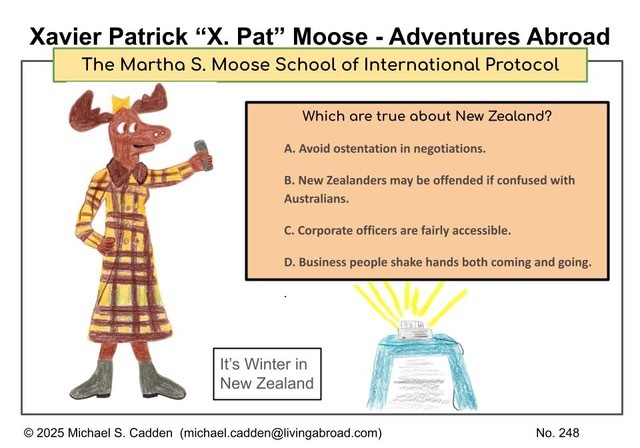

Answers: All are true
Business negotiations
When negotiating with New Zealanders, it is important to stick to the point and to avoid ostentation. They appreciate honesty and directness, not hype.
Also, references to wealth and social status - even on behalf of a company - are not appreciated since New Zealanders take pride in their egalitarian society. New Zealanders are proud of their emphasis on equality and equal opportunity.
Managerial positions are awarded based on performance, honesty and trustworthiness. Business negotiations of all types are similarly influenced.
The business environment is very similar to that in North America and Europe, with a clear definition between top- and lower-level employees.
Corporate officers are open to business discussions, and reaching them is not usually difficult.
Excerpted from Living Abroad's New Zealand Report/ Business practices / Business negotiations
Business style
North American and British business people find that taking business dealings to this English-speaking democracy is virtually seamless in terms of customs and expectations. The biggest hurdle is the distance to travel.
New Zealanders are direct and fairly relaxed in business, and they favor forthrightness over showmanship.
Humanitarianism is a pervasive character trait in New Zealanders, and they value human progress and care of the individual person. Individualism is also highly valued, and a person's highest reward is to be recognized for an achievement.
New Zealanders are generally open and friendly. They are practical, strong and self-reliant, and are dedicated to family and home. They are proud and patriotic, and work hard to improve their homes and gardens.
While it is stating the obvious, newcomers should be aware that New Zealanders are not the same as Australians, although some find that is their expectation. Australians tend to be affable but direct, sometimes to the point of bluntness; New Zealanders are described as being a bit more staid. The comparison has often been drawn about the differences between the U.S. and Canada, Canadians inevitably being described as a quieter, more composed people. The same could be said for New Zealanders.
New Zealand people are very receptive to new ideas and to travelers from around the world. The multicultural environment welcomes and assimilates foreigners with ease.
New Zealanders have shared a common bond with the British, who first settled in the country in 1769. The two countries also share a sovereign queen. A friendly rivalry exists between New Zealanders and Australians, to whom they are often compared and with whom they are sometimes confused by foreigners.
Customs and protocol
Business customs in New Zealand are quite similar to those in the U.S. and Canada, and a bit less formal than those in the U.K.
The British history in New Zealand has set the precedent for many similar customs and behaviors. Business people accustomed to doing business in the U.K. will understand local business customs in New Zealand.
Corporate officers are open to business discussions, and reaching them is not usually difficult. This may be an adjustment for newcomers from more hierarchical cultures, who should make an effort to contribute ideas in settings where that is encouraged. New Zealanders tend to soften requests with qualifiers like "I wonder if we could" or "What about doing it this way?" rather than direct demands and blunt feedback.
Use of first names is common, especially if there has been extensive phone contact prior to meeting. Business people shake hands both when greeting and when saying good-bye.
Take along business cards, as the practice of exchanging them is becoming more common.
As in any country, follow your host's example, trust your own instincts and remember that formalities common in most developed countries are certainly suitable here.
Excerpted from Living Abroad's New Zealand Report/Business practices / Business style
Written by Michael Cadden, SGMS-T, VP International Operations
